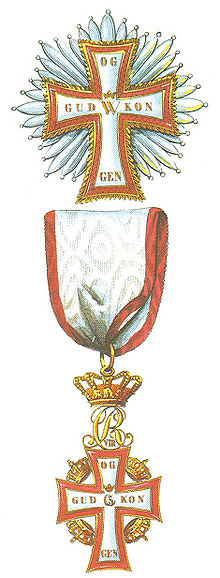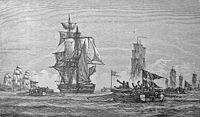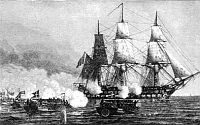Johan Cornelius Krieger (Admiral, 1756)

Johan Cornelius Krieger (born July 7, 1756 in Copenhagen , Denmark-Norway , † July 9, 1824 in Copenhagen) was a Danish naval officer. He is considered to be the father of modern Danish coastal defense.
Life
Johan was the son of the Danish Vice Admiral Johan Cornelius Krieger († 1797) and Sophia Magdalene Arff and the grandson of the architect Johan Cornelius Krieger († 1755). He joined the Danish Navy as early as 1763 . As a cadet he took part in a mission to Morocco in 1767 and in 1770/71 in the operation of Rear Admiral Frederik Christian Kaas against the Barbaresque pirates of Algiers, whereupon he was finally appointed lieutenant in 1771. In 1776 he became a lieutenant.
During the American War of Independence , in which France and the USA fought against Great Britain, but Denmark remained neutral , Krieger was released in 1778 along with seven other officers to serve in the French Navy. Until 1781, Krieger fought successfully under the French admirals d'Estaing , de Grasse and de Guichen against the British admirals Graves , Hood and Rodney , was wounded several times, was awarded the Ordre pour le mérite militaire and was promoted to lieutenant captain in 1781.
From 1781 to 1783 Krieger sailed with merchant ships to the Danish West Indies , from 1784 he was assigned to the units mobilized against Sweden in the Baltic Sea before he received his first command of a small ship in 1788. During the Russo-Swedish War , Krieger was initially posted as a liaison officer on Russian warships and advisor to the Russian Admiralty, then in 1789 he was promoted to captain and was given command of a Danish frigate.
From 1796, Krieger commanded the frigate Najaden , with which he fought against the barbaric pirates of Tripoli in 1797, forced Tunis to surrender Danish ships in 1800 and, after the outbreak of renewed tensions with Great Britain, took command of all Danish ships in the Mediterranean from 1800. Back in Denmark he was a member of the Norwegian Naval Defense Commission from 1801 to 1803, and from 1805 he commanded a ship of the line for the first time. In 1807 he became royal chamberlain.
After the British attack on Copenhagen , in which the Royal Navy robbed almost the entire Danish fleet in 1807, Krieger was promoted to Commodore in 1808 and he was given command of the last remaining ship of the line, the Lovisa Augusta . The Lovisa Augusta became the flagship of the Danish gunboat flotilla, which consisted of 33 smaller ships that remained with the Danes. In the Øresund, Krieger carried out repeated attacks on enemy British-Swedish convoys with small, cannon-armed Danish and Norwegian rowing barrows. The British brig HMS Turbulent was captured in July 1808 , and in October 1808 the capture of the British liner HMS Africa only just failed in a spectacular attack . As commander of all gunboats (from 1810), rear admiral (from 1812) and chairman of the Danish Maritime Defense and Coastal Fortification Commission (from 1812), he reorganized and modernized the protection of the Danish coasts and home waters. Based on small cannon and coastal defense boats, Krieger developed a defense concept that was in principle applied and further developed until the end of the 20th century. As chief inspector of the arsenal and the war yards of Copenhagen ( Holmadmiral or Overekvipagemester ) he contributed to the reconstruction of the fleet from the peace treaty of 1814 until his death.
In addition to the French awards from the American War, Krieger became commander of the Dannebrog Order in 1809 , received the Grand Cross of the same in 1815 and was appointed to the knighthood.
Krieger was married three times: in 1787 with Sophie Vilhelmine Caroline Bornemann († 1792), in 1794 with Dorothea Sara Marie Meincke († 1809) and in 1811 with Anna Cathrine Falbe.
literature
- C. With-Seidelin: Warriors, Johan Cornelius . In: Christian Blangstrup (Ed.): Salmonsens Konversationsleksikon . 2nd Edition. tape 14 : Kirkeskov – Kvadratrix . JH Schultz Forlag, Copenhagen 1923, p. 657 (Danish, runeberg.org ).
- C. With: Krieger, Johan Cornelius . In: Carl Frederik Bricka (Ed.): Dansk biografisk Lexikon. Tillige omfattende Norge for Tidsrummet 1537-1814. 1st edition. tape 9 : Jyde – Køtschau . Gyldendalske Boghandels Forlag, Copenhagen 1895, p. 497-499 (Danish, runeberg.org ).
- Johnny Balsved: Rearmiral JC Krieger (1756-1824). In: Danish Naval History. ( navalhistory.dk )
| personal data | |
|---|---|
| SURNAME | Warrior, Johan Cornelius |
| BRIEF DESCRIPTION | Danish admiral |
| DATE OF BIRTH | July 7, 1756 |
| PLACE OF BIRTH | Copenhagen , Denmark-Norway |
| DATE OF DEATH | July 9, 1824 |
| Place of death | Copenhagen , Denmark-Norway |



